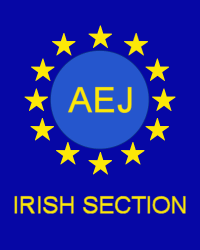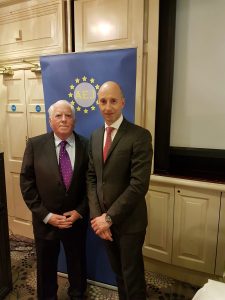Address by Jon Williams, Managing Director, News and Current Affairs, RTE, at Speakers’ Lunch, Buswells Hotel, Dublin, on Friday, 12th May, 2017.
In 1984, the editor of Colombia’s El Spectatador newspaper, Guillermo Cano wrote “Only the independence, the character, the objectivity and the good judgment of the journalist and the media can overcome the terrible storms of the new world that threaten freedom of information everywhere.” Two years later he was murdered in front of the paper’s offices by two hitmen linked to Colombia’s drug cartels. The paper had run a campaign denouncing the influence of drug traffickers in the country’s politics. A decade later – and for the past 20 years – on World Press Freedom Day, the UN awarded its Press Freedom prize in Guillermo’s honor. The tragedy today, is that those “terrible storms” Cano cautioned of 33 years ago are arguably stronger now than ever before.
Old challenges are merging with new threats. Media accountability and credibility are falling under question. Trust is at risk. “Post-truth.” and “fake news,” go the heart of free, independent and professional journalism. And all this comes at a time when free, independent and pluralistic media has never been so important. Where once the focus of the fight for Press Freedom was on places like Iran, China or Egypt, today, it’s rather closer to home: the US, the UK – and yes, Ireland too: 14th in this year’s Reporters Without Borders’ World Press Freedom index, down 5 places in a year. It is why this year’s theme for World Press Freedom Day – Critical Minds for Critical Times – is so pertinent. Critical thinking has never been more important.
Donald Trump’s first tweet after the election was about “professional protesters incited by the media.” As too many in Iran, China or Egypt can attest, first the media is accused of inciting, then sympathizing, then associating–until they suddenly find themselves accused of being full-fledged terrorists and subversives. Just ask our friends in Turkey. If ever there’s a time to celebrate, honour, protect, and mobilize for press freedom and basic good journalism, it is now. And not just in far-away places. That fight starts here.
I’ve just finished writing the chapter of a book on Brexit – and the Trump connection. The hypothesis: That essentially: that essentially Brexit couldn’t have happened without Trump – and that Trump used Brexit to supercharge his campaign – “Mr Brexit” he called himself in the run up to the US election. One thing both campaigns had in common: “alternative facts” – whether it’s the prospect and an extra £350 million a week for the NHS in the UK or Trump’s claims around immigrants and “bad dudes”. Two campaigns on two continents, defined by one message: the very reverse of former Guardian editor, C.P. Scott’s construction ‘comment is free, but facts are sacred’.
Let me just talk too about Ireland. By way of context, it’s worth saying that even though Ireland has been relegated from the Press Freedom top 10 this year, it sits 26 places above the UK, 29 places above the United States. But there is a chill settling in here too. Interviewing policing sources is made more difficult since the Garda Siochana Act of 2005, which bans Gardai from talking to journalists without prior authorization. Officers contravening the ban risk dismissal, a fine, or up to seven years in prison. And now we face a Tribunal of Inquiry looking into possible briefings between serving Gardai and the media. Mr Justice Charleton has already set out his thoughts on the exercise of journalistic privilege, questioning whether it extends to sources with malicious motivations.
The law in Ireland has come a long way since the 1970s. In 1972, RTÉ’s Kevin O’Kelly was jailed for contempt of court for refusing to outline the circumstances of an interview he had conducted with the, then, Provisional IRA chief of staff Seán Mac Stiofáin. Today, Article 10 of the European Convention on Human Rights provides that: “Everyone has the right to freedom of expression. This right shall include freedom to hold opinions and to receive and impart information and ideas without interference by public authority and regardless of frontiers.” And The Irish Times’ 2009 case, Mahon Tribunal v Keena and Kennedy, in which the Supreme Court, while relying heavily on the article of the European Convention, also acknowledged journalistic privilege as a constitutional principle for the first time. Protecting sources is a bedrock of journalistic ethics and the protection of confidential sources is a guiding principle of the Press Council Code of Practice for Newspapers and Periodicals.
But the Supreme Court in The Irish Times case insisted that such right is not absolute. Journalists will still be compelled to answer questions or reveal sources by a court if disclosure is deemed justified “by an overriding requirement in the public interest”. That means journalistic privilege has to be balanced against other rights, such as that of a tribunal to conduct its business. We’ll see where we end up in the coming months.
But let me end where I began. As bad as things are in the US, as much as the situation is deteriorating here, they pale by comparison with many other places around the world. When the CPJ did the sums last Christmas, 81 journalists were jailed in Turkey, all of them facing anti-state charges, in the wake of an unprecedented crackdown that has included the shuttering of more than 100 news outlets. The 259 journalists imprisoned worldwide is the highest number recorded since 1990. And since World Press Freedom Day was proclaimed by the UN General Assembly in 1993, 1233 journalists have been killed – 102 paid the ultimate price last year alone, 14 in Syria. Too many of their killers will never be brought to justice. 33 years after Guillermo Cano talked about “the terrible storms that threaten freedom of information” that fight for press freedom has never been more important.

